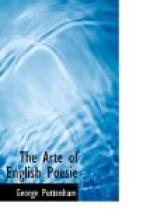CHAP. XXI.
The forme wherein honest and profitable Artes and sciences were treated.
The profitable sciences were no lesse meete to be imported to the greater number of ciuill men for instruction of the people and increase of knowledge, then to be reserued and kept for clerkes and great men onely. So as next vnto the things historicall such doctrines and arts as the common wealth fared the better by, were esteemed and allowed. And the same were treated by Poets in verse Exameter fauouring the Heroicall, and for the grauitie and comelinesse of the meetre most vsed with the Greekes and Latines to sad purposes. Such were the Philosophicall works of Lucretius Carus among the Romaines, the Astronomicall of Aratus and Manilius, one Greeke th’other Latine, the Medicinall of Nicander, and that of Oprianus of hunting and fishes, and many moe that were too long to recite in this place.
CHAP. XXII.
In what forme of Poesie the amorous affections and allurements were vttered.
The first founder of all good affections is honest loue, as the mother of all the vicious is hatred. It was not therefore without reason that so commendable, yea honourable a thing as loue well meant, were it in Princely estate or priuate, might in all ciuil common wealths be vttered in good forme and order as other laudable things are. And because loue is of all other humane affections the most puissant and passionate, and most generall to all sortes and ages of men and women, so as whether it be of the yong or old or wise or holy, or high estate or low, none euer could truly bragge of any exemption in that case: it requireth a forme of Poesie variable, inconstant, affected, curious and most witty of any others, whereof the ioyes were to be vttered in one sorte, the sorrowes in an other, and by the many formes of Poesie, the many moodes and pangs of louers, throughly to be discouered: the poore soules sometimes praying, beseeching, sometime honouring, auancing, praising: an other while railing, reuiling, and cursing: then sorrowing, weeping, lamenting: in the ende laughing, reioysing & solacing the beloued againe, with a thousand delicate deuises, odes, songs, elegies, ballads, sonets and other ditties, moouing one way and another to great compassion.
CHAP. XXIII.
The forme of Poeticall reioysings.
Pleasure is the chiefe parte of mans felicity in this world, and also (as our Theologians say) in the world to come. Therefore while we may (yea alwaies if it could be) to reioyce and take our pleasures in vertuous and honest sort, it is not only allowable, but also necessary and very naturall to man. And many be the ioyes and consolations of the hart: but none greater, than such as he may vtter and discouer by some conuenient meanes: euen as to suppresse and hide a mans mirth, and not to haue therein a partaker,




